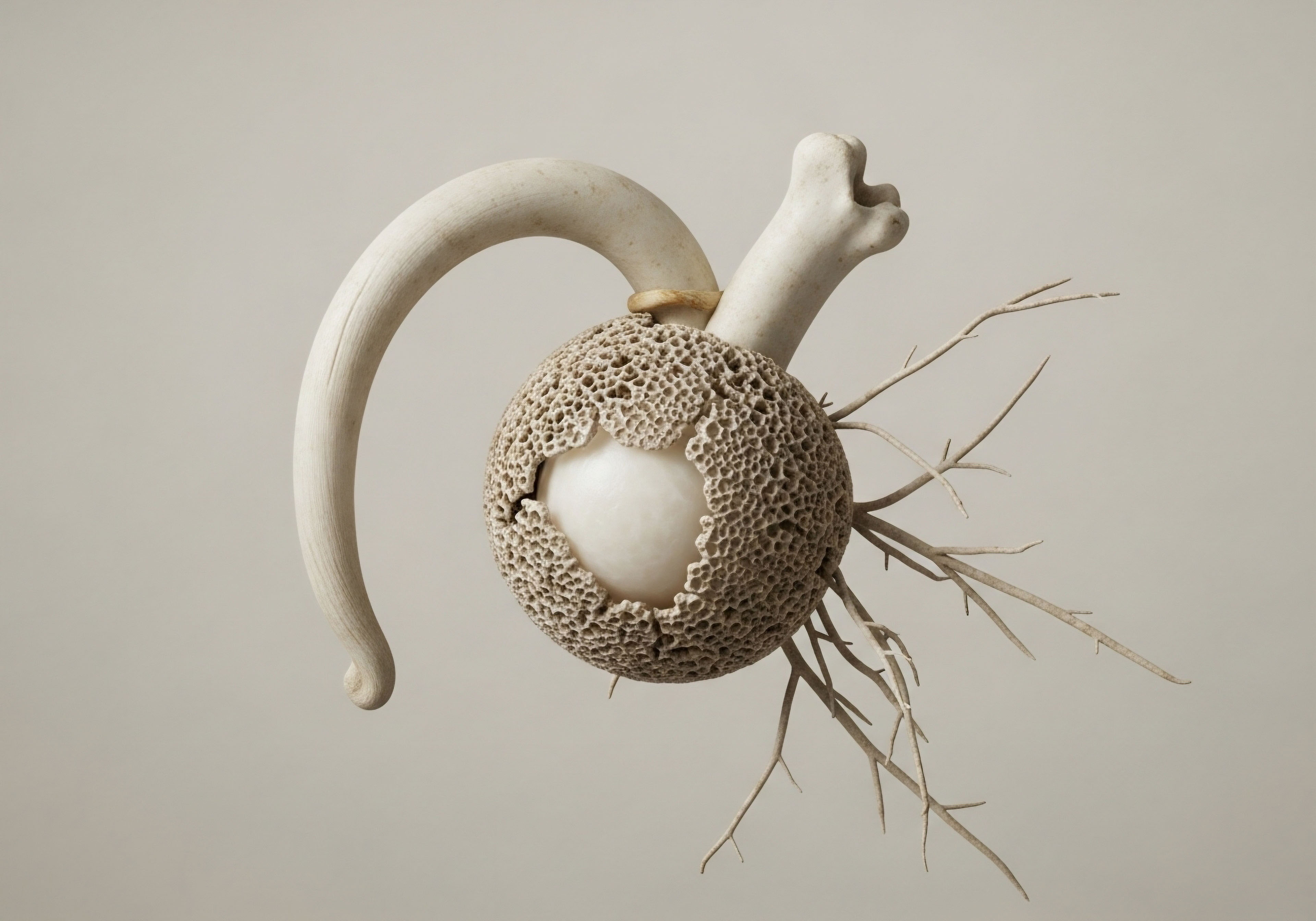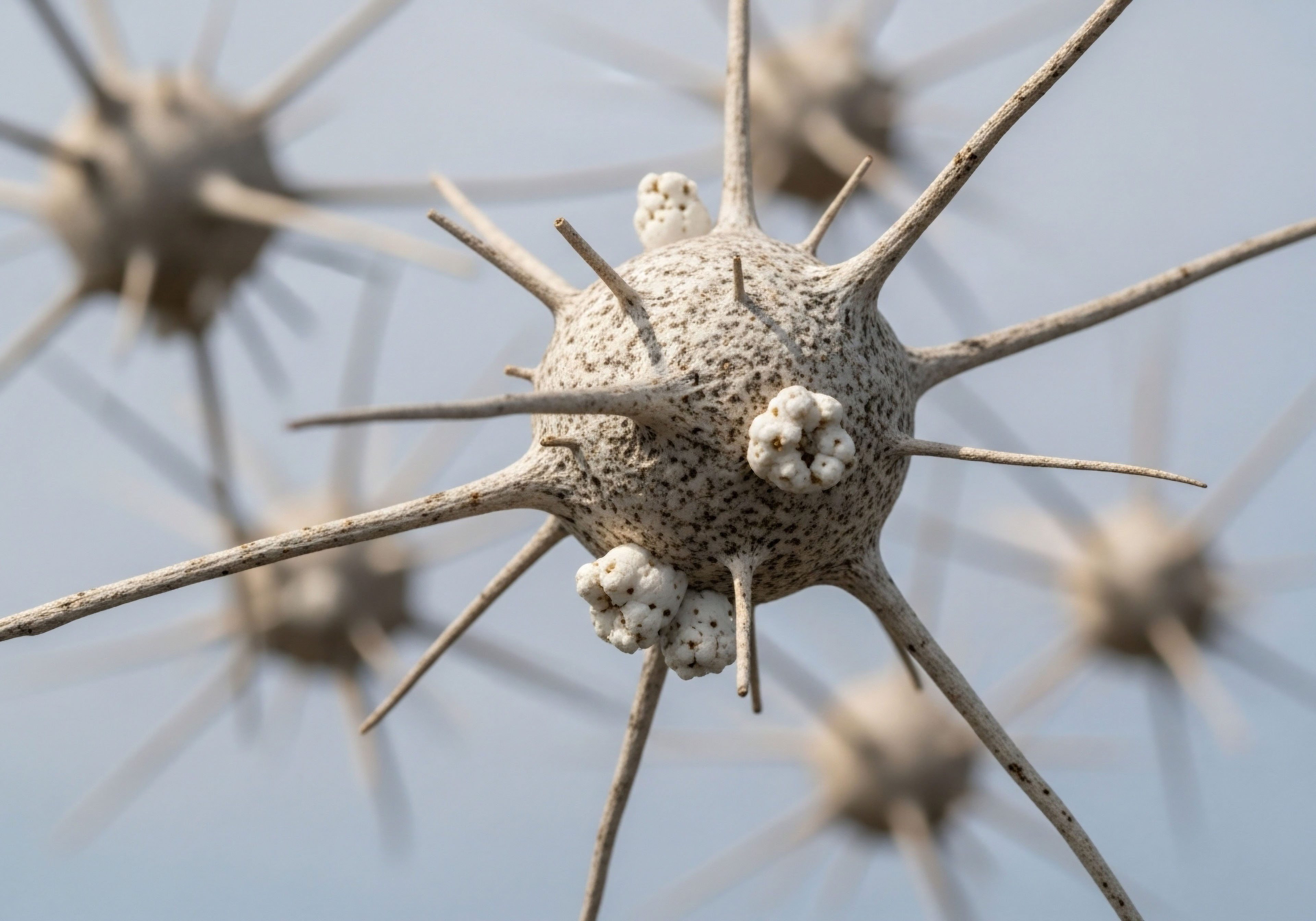

Fundamentals
Beginning a protocol of testosterone replacement therapy (TRT) marks a significant step in reclaiming your body’s functional vitality. You may have arrived here after experiencing a cascade of subtle, yet persistent, symptoms ∞ fatigue that sleep does not resolve, a muted sense of well-being, or a decline in physical strength.
The decision to initiate hormonal optimization is a commitment to restoring a fundamental biological system. Your prescribed therapy is the key that turns the engine back on; the dietary choices you make are the high-quality fuel required to make that engine perform powerfully and efficiently.
Think of your endocrine system as a complex communication network. Hormones are the messengers, and testosterone is a particularly potent one, carrying signals that influence muscle growth, energy metabolism, and cognitive function. When you begin TRT, you are reintroducing a clear, strong signal into this network.
Your body’s ability to act on that signal, however, is directly dependent on the resources available. A diet rich in specific nutrients provides the raw materials needed to translate the hormonal message into tangible physical results. Without these materials, the signal, however strong, cannot be fully received or utilized. This is the foundational principle of nutritional support during hormonal recalibration.

The Core Building Blocks for Hormonal Efficacy
The therapeutic introduction of testosterone creates an anabolic environment, meaning your body is primed for building and repair. This process is metabolically demanding and requires a consistent supply of specific macronutrients. Providing these resources is the most direct way you can support your body’s renewed potential for strength and vitality.
Protein stands as the primary architectural material for this process. The elevated testosterone levels from your therapy signal your muscles to synthesize new tissue at an accelerated rate. To meet this demand, a sufficient intake of high-quality protein is essential. Lean meats, fish, eggs, and legumes supply the amino acids necessary for muscle repair and growth.
Consuming adequate protein ensures that the anabolic signals sent by the therapy have the resources to manifest as increased lean muscle mass and improved physical strength.
Your diet provides the essential raw materials your body needs to effectively use the renewed hormonal signals from TRT.
Healthy fats are equally important, as they form the very foundation of hormone molecules themselves. Steroid hormones, including testosterone, are synthesized from cholesterol. A diet incorporating healthy fats, such as those found in avocados, nuts, seeds, and olive oil, supports the entire endocrine cascade.
These fats are integral to cellular health, ensuring that cell membranes remain fluid and responsive to hormonal signals. This supports not only the direct action of the therapy but also the balance of the entire hormonal system.

Micronutrients the Catalysts of Endocrine Function
While macronutrients provide the building blocks, micronutrients act as the catalysts that drive the biochemical reactions of hormonal health. Two minerals, zinc and magnesium, are particularly significant for individuals undergoing testosterone therapy. Zinc functions as a critical cofactor in testosterone synthesis and metabolism. Even with externally supplied testosterone, zinc helps the body process and utilize hormones efficiently. Magnesium contributes to hundreds of enzymatic reactions, including those involved in muscle function and energy production, which are amplified during TRT.
Vitamin D, often called the “sunshine vitamin,” functions more like a hormone than a vitamin within the body. It plays a direct role in supporting testosterone synthesis and overall hormonal health. Many individuals, especially those in regions with limited sun exposure, have suboptimal levels. Ensuring adequate vitamin D levels through sensible sun exposure, fortified foods, or supplementation provides another layer of support for your body’s endocrine system, helping to create a more receptive internal environment for your therapy.


Intermediate
As you become accustomed to the initial effects of testosterone replacement therapy, a more refined nutritional strategy can help you optimize the benefits and manage potential metabolic shifts. This involves looking beyond basic macronutrients and understanding the interplay between your diet, your hormonal protocol, and your body’s systemic responses. A key area of focus is managing the activity of the aromatase enzyme, which is a critical junction in steroid hormone metabolism.
Aromatase is an enzyme present in various tissues, particularly adipose (fat) tissue, that converts androgens like testosterone into estrogens. This is a natural and necessary process for maintaining hormonal balance. During TRT, however, elevated testosterone levels can lead to an increased rate of this conversion, potentially resulting in higher-than-optimal estrogen levels.
This can counteract some of the desired effects of the therapy and contribute to side effects such as water retention. Since aromatase is highly active in fat cells, maintaining a healthy body composition is a primary strategy for managing its activity.

Nutritional Modulation of Estrogen Metabolism
Specific dietary choices can influence estrogen balance. Cruciferous vegetables ∞ such as broccoli, cauliflower, and kale ∞ contain compounds like indole-3-carbinol, which can support the healthy metabolism and clearance of estrogen metabolites through the liver. Similarly, a diet rich in fiber helps bind estrogen in the digestive tract, promoting its excretion and preventing its reabsorption into circulation.
These nutritional strategies work in concert with the anastrozole tablets often included in TRT protocols, which directly inhibit the aromatase enzyme, to maintain a favorable testosterone-to-estrogen ratio.
Antioxidants also play a protective role. The increased metabolic rate spurred by TRT can generate more oxidative stress. Foods rich in antioxidants, such as berries, dark leafy greens, and nuts, help protect your cells and hormones from this oxidative damage, supporting overall cellular health and endocrine function.
A strategic diet can help manage estrogen conversion and support the body’s increased metabolic demands during TRT.

Macronutrient Structuring for TRT Objectives
Your dietary plan should be tailored to your specific goals, whether they are focused on building lean mass, reducing body fat, or enhancing overall vitality. The following table outlines how to structure your macronutrient intake to support these objectives while on a hormonal optimization protocol.
| Macronutrient | Role in Supporting TRT | Recommended Food Sources |
|---|---|---|
| Protein | Provides the essential amino acids required for the muscle protein synthesis signaled by testosterone. Supports lean mass accretion and metabolic rate. | Lean beef, chicken breast, wild-caught salmon, eggs, Greek yogurt, lentils, quinoa. |
| Healthy Fats | Serves as a precursor for steroid hormone production and supports cellular membrane health, ensuring cells are responsive to hormonal signals. Provides sustained energy. | Avocados, almonds, walnuts, chia seeds, flaxseeds, olive oil. |
| Complex Carbohydrates | Replenishes muscle glycogen stores after exercise, which is crucial for performance and recovery. Provides fiber for digestive health and estrogen clearance. | Oats, brown rice, sweet potatoes, fruits, and a wide variety of vegetables. |

What Are the Key Micronutrients for Hormonal Support?
Certain vitamins and minerals are indispensable for optimizing the body’s response to androgen therapy. Their roles extend from direct hormone synthesis to managing potential side effects of the treatment. A well-formulated diet should ensure an adequate supply of these essential cofactors.
- Zinc ∞ Directly involved in the synthesis and regulation of testosterone. It acts as a catalyst in numerous enzymatic reactions critical to endocrine function. Sources include shellfish, lean meats, and pumpkin seeds.
- Vitamin D ∞ Functions as a pro-hormone that is essential for testosterone production and overall hormonal equilibrium. It is found in fatty fish, fortified foods, and is synthesized via sun exposure.
- Magnesium ∞ Supports muscle function, energy production, and nerve transmission. It also helps regulate blood pressure, which is an important health marker to monitor during therapy. Sources include leafy greens, nuts, and seeds.
- Selenium ∞ An antioxidant mineral that is important for thyroid function, which is closely linked to overall metabolic rate and energy levels. Brazil nuts are an exceptionally rich source.
- B Vitamins ∞ A complex of vitamins that are fundamental to energy metabolism. They help the body convert food into usable energy, a process that is upregulated with the increased metabolic demands of TRT.


Academic
A sophisticated approach to nutrition during testosterone replacement therapy moves beyond general recommendations and into the realm of targeted biochemical and physiological modulation. The therapy itself provides a powerful anabolic and metabolic signal; however, the ultimate clinical outcomes, particularly regarding body composition, are the result of a synergistic interaction between this hormonal signal and specific dietary inputs.
Research demonstrates that combining TRT with structured dietary manipulation can produce superior results in reducing adiposity and preserving lean body mass compared to either intervention alone.
One clinical trial highlighted that a combination of TRT and a diet characterized by reduced caloric intake, low fat, and high protein led to significant improvements in body composition. The physiological principle at work is twofold. First, TRT provides the potent stimulus for muscle protein synthesis and helps maintain basal metabolic rate, which can otherwise decrease during periods of caloric restriction.
Second, the high-protein, calorie-controlled diet provides the necessary amino acid substrates for muscle accretion while creating the energy deficit required for fat loss. This integrated approach effectively uncouples the typical loss of lean mass associated with weight loss, directing the body’s resources toward a more favorable metabolic state.

How Does Gut Health Influence Hormone Therapy Outcomes?
The interconnectedness of the body’s systems means that the efficacy of endocrine therapy is influenced by seemingly distant biological processes, including the health of the gut microbiome. The gut-hormone axis is a bidirectional communication pathway that has profound implications for individuals on TRT. The microbiome influences systemic inflammation, nutrient absorption, and the metabolism of hormones, including the clearance of estrogen metabolites.
A diet high in fermentable fibers from diverse plant sources cultivates a healthy gut microbial community. These microbes produce short-chain fatty acids (SCFAs), such as butyrate, which have systemic anti-inflammatory effects. Chronic low-grade inflammation can blunt the sensitivity of androgen receptors, potentially diminishing the effectiveness of TRT.
By promoting a robust microbiome, a fiber-rich diet helps to quell inflammation and support a more efficient hormonal signaling environment. Furthermore, a healthy gut is essential for the proper detoxification and elimination of estrogen, contributing to a more balanced hormonal profile.
The interplay between TRT, a high-protein diet, and a healthy gut microbiome creates a synergistic effect that optimizes body composition and hormonal balance.

Nutritional Strategies for Mitigating TRT-Associated Health Risks
While TRT offers significant benefits, clinical guidelines also require monitoring for potential risks, including adverse shifts in cardiovascular markers and increases in red blood cell concentration (polycythemia). A targeted nutritional strategy can be a valuable component of a comprehensive approach to mitigating these risks. The table below outlines potential risks and corresponding dietary considerations that support overall health during therapy.
| Potential Clinical Consideration | Underlying Mechanism | Supportive Nutritional Strategy |
|---|---|---|
| Cardiovascular Health | Concerns regarding potential impacts on lipid profiles and fluid balance. | Emphasize omega-3 fatty acids from fatty fish to support healthy lipid levels and reduce inflammation. Maintain a low-sodium, high-potassium diet rich in fruits and vegetables to support healthy blood pressure. |
| Polycythemia (Elevated Hematocrit) | Testosterone can stimulate erythropoiesis (red blood cell production), potentially increasing blood viscosity. | Ensure adequate hydration to maintain healthy blood volume and viscosity. Regular consumption of antioxidant-rich foods can support overall vascular health. |
| Prostate Health | Monitoring of prostate-specific antigen (PSA) is a standard part of TRT protocols. | Incorporate foods rich in lycopene (e.g. tomatoes) and selenium (e.g. Brazil nuts), which are antioxidants studied for their role in supporting prostate health. |
| Hepatic (Liver) Stress | The liver is central to metabolizing hormones and medications. | Support liver function with a diet rich in cruciferous vegetables and antioxidants. Limiting alcohol consumption is also a key supportive measure. |

References
- Medical Specialists. “The Ultimate TRT Diet Guide ∞ 12 Proven Nutrition Rules to Help Supercharge Your Testosterone Replacement Therapy.” Medical Specialists, 9 June 2025.
- North Dallas Wellness. “Nutritional Support for Men on Testosterone Replacement Therapy.” North Dallas Wellness, 10 May 2024.
- U.S. Department of Veterans Affairs. “Improving Low Testosterone Naturally.” Whole Health Library, VA.gov.
- Gorgey, Ashraf S. and David R. Gater. “Dietary manipulation and testosterone replacement therapy may explain changes in body composition after spinal cord injury ∞ A retrospective case report.” World Journal of Orthopedics, vol. 7, no. 10, 2016, pp. 671-678.
- Lazarou, S. and J. D. Fisse. “Testosterone Therapy ∞ Review of Clinical Applications.” American Family Physician, vol. 96, no. 7, 2017, pp. 425-429.

Reflection

Integrating Knowledge into Your Personal Protocol
You have now explored the layers of nutritional science that complement and enhance a hormonal optimization protocol. This knowledge transforms your daily meals from simple sustenance into a powerful tool for biological engineering. The food on your plate becomes an active participant in your therapy, a constant, deliberate input that can steer your physiology toward resilience, strength, and vitality. This understanding moves you beyond simply following a plan; it positions you as the architect of your own well-being.
Consider your own body’s responses as you integrate these principles. How does your energy shift with changes in your protein intake? How does your physical performance respond to better hydration and micronutrient support? This journey of recalibration is deeply personal. The information presented here is a map, yet you are the one navigating the territory.
Use this knowledge as a starting point to build a protocol that is not just prescribed, but truly personalized, aligning your daily actions with your long-term vision of health.



